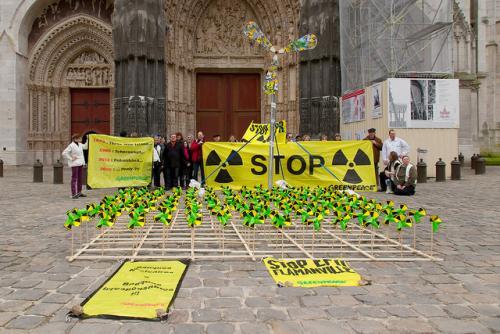This week’s Story Community Call was well visited. We talk about the new story of Greenpeace, story as a theory of change, culture shifts and all things open. I’m enthused to see both new faces and repeat customers in this call. Read about some past community calls here. Read all our notes for March calls here.
We decided several weeks ago to discuss each of the 7 Shifts in detail. Last call I was on a boat, so this week we were discussing Shift 2: Reinforcing Old Stories to Building New Ones.
Everything in life is a balance. Black is offset by white. Light/Darkness. Good/Bad. Attack Campaigning/Solutions Campaigning.
The discussion kicked off with the idea that Greenpeace isn’t great at championing solutions with new stories. We often push the more negative attack narrative. We talked about whether Greenpeace has a historical responsibility to use “No”, “Don’t”, “Stop”. Flo, an actions coordinator, said that
“Greenpeace does tell positive stories. The question is, are we good at selling it? Are we the right people to promote solutions? Or is it our role to say “stop”?*”

The group considered this, but decided that Greenpeace needs to find a better balance. Joeg, from the UK office, talked about positive campaigning. He said,
“It’s not necessarily more effective but [solutions driven campaigning] rounds out a picture.”
Eric said that in the context of the general pessimist mood and the state of the world, Greenpeace needs to give HOPE to people that another world in possible.
We talked a lot about the Food for Life campaign, its positive, solutions oriented approach. We discussed that solutions need to be systemic (hence ‘disruptive solutions’, which we’ll hear more about in a future call) to avoid reinforcing corporate control and be more people-focused. Mike, from the Rainbow Warrior, suggested a practical way to use the ships in the Food for Life campaign. I hope someone follows up on that idea!
We moved forward in the agenda with a brief mention of an opportunity to share our community and story as a theory of change at an upcoming meeting. Next, we talked about the new Greenpeace Brand Guide. Martin, from GP Netherlands, wondered allowed why this piece of work wasn’t shared sooner. I reaffirmed the need for Greenpeace staff to get comfortable releasing early and often.
The Brand Guide led us down a path of discussing the merits of “Values Based Segmentation”. Greenpeace has done a lot of research in this area, but currently it’s no one’s full time job to keep up with the VBS work. After the discussion, the Engagement Support Team and our Research Manager sent me a note to say “We’re happy to answer questions!” Campaigning is a lot about marketing. If we find frameworks that help us talk to our audiences, we should use them. We decided practical examples of the actual VBS usage are something we could use. Lucie, in Prague, summed it up with
“There is no typical ‘Now’ person. The segmentation doesn’t fit with individuals. We can’t reduce our audiences to a model, but we are marketers. We are selling a vision, we should use methodologies if it works for this cause.”
Word is starting to spread that this call is “psychologically safe”, which was the final topic we spoke about on Tuesday. Mike, from the Rainbow Warrior, talked about ships as a psychologically safe place. He said, “On a ship you have a small community of people and the reason we are so effective is because we are living, eating, cleaning together. You become a family. Families have empathy for one another and work together like this. When you are doing campaigns you develop incredible comaraderie because of the empathy.”
“The behaviors that create psychological safety — conversational turn-taking and empathy — are part of the same unwritten rules we often turn to, as individuals, when we need to establish a bond. And those human bonds matter as much at work as anywhere else. In fact, they sometimes matter more.” – What Google Learned from its Quest to Build the Perfect Team
Human bonds and empathy building, as well as obliterating silos, are just some of the benefits to this community call. As we become established in this community, as we begin to trust one another, I’m hopeful that this call will become a place where we make practical decisions and move our work forward.
This call is biweekly, join us.
*Quotes in posts about community calls are always paraphrased.
Where I live, in a cohousing “project”, one of the members is a certified NVC (as in Nonviolent Communication – from Marshall Rosenberg) trainer. She has stimulated the setting up of “empathy circles”, exactly this kind of psychologically safe space for people to practice, receive and give empathy. There’s a long way to go, still, but it is becoming established practice.
I think the reason why it works here is both because we tend to share some values here (though not as many as some people hoped!) but also that, by sharing quite a lot (compared with the average household) we have a good amount invested in being responsible neighbours, psychologically as well as materially.
In my experience, this kind of thing only works well when the level of trust has built up to a good level. The real difficulty with having open sessions is that one does not know newcomers. I don’t think there’s much resilience in that.
Work is a good place to build up this kind of thing, I agree. So I wish the best to Greenpeace people in doing this. I just caution against it being too open.